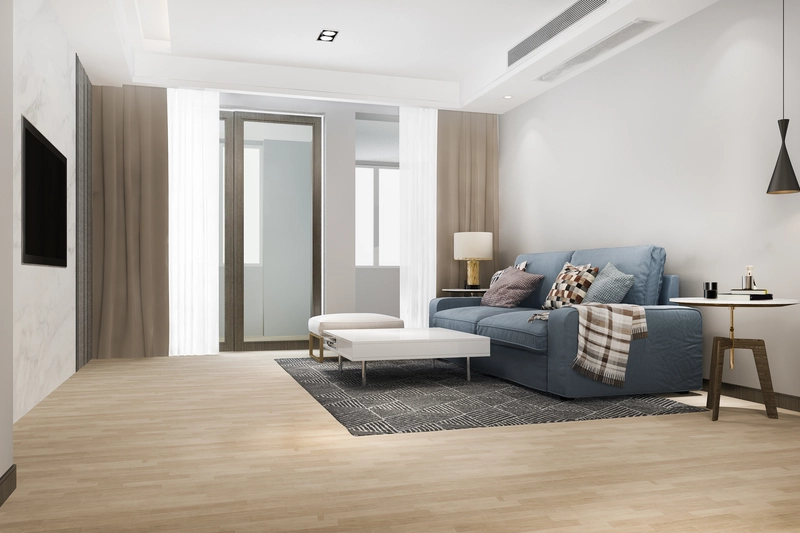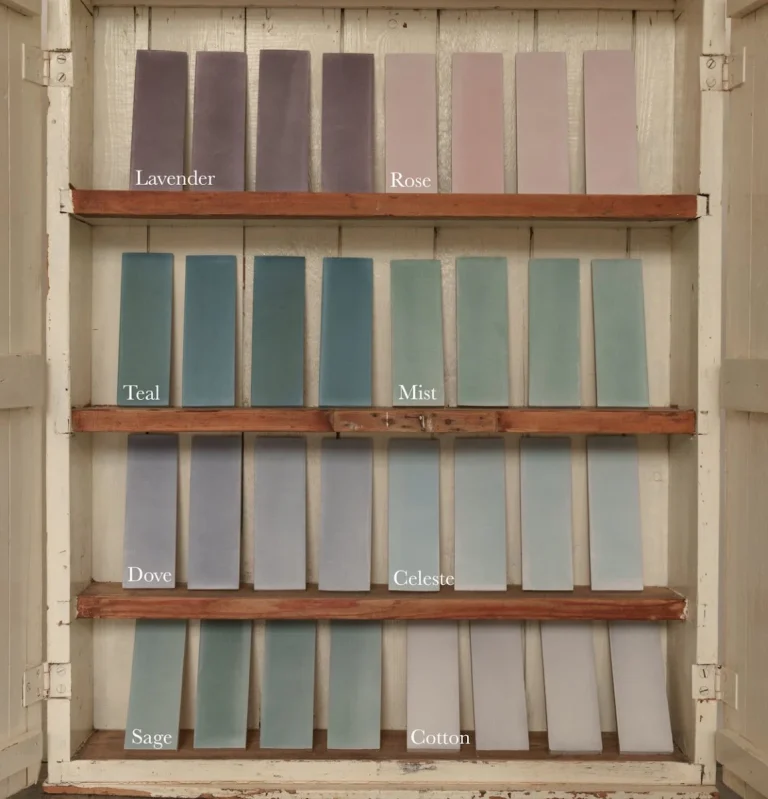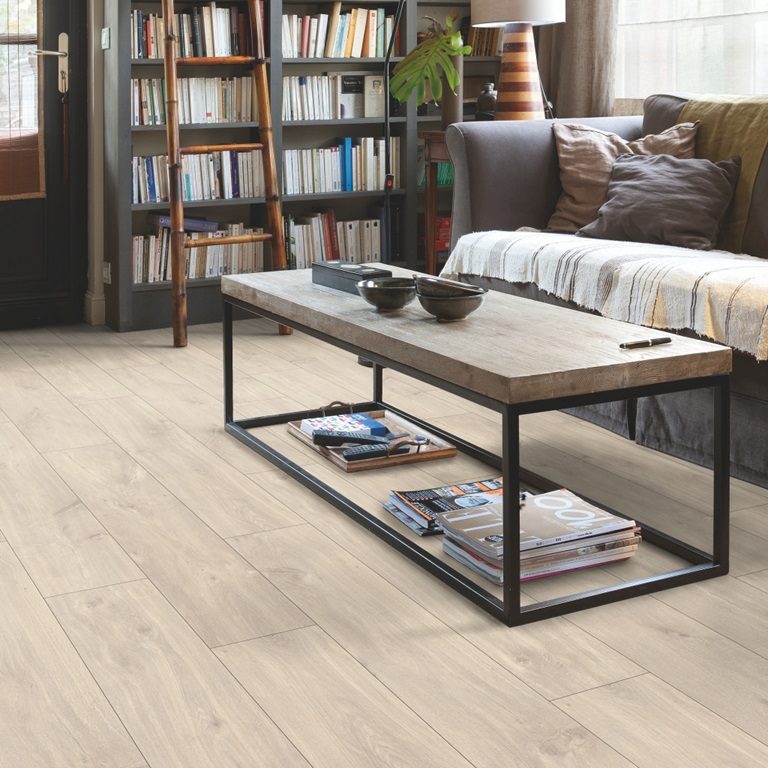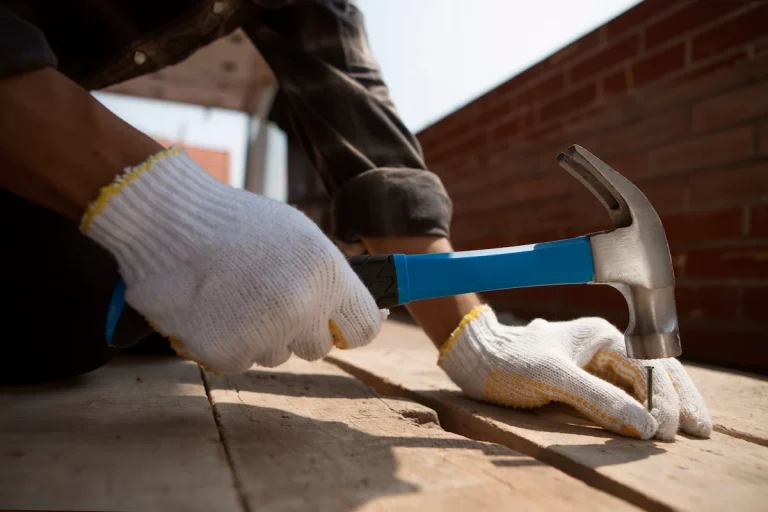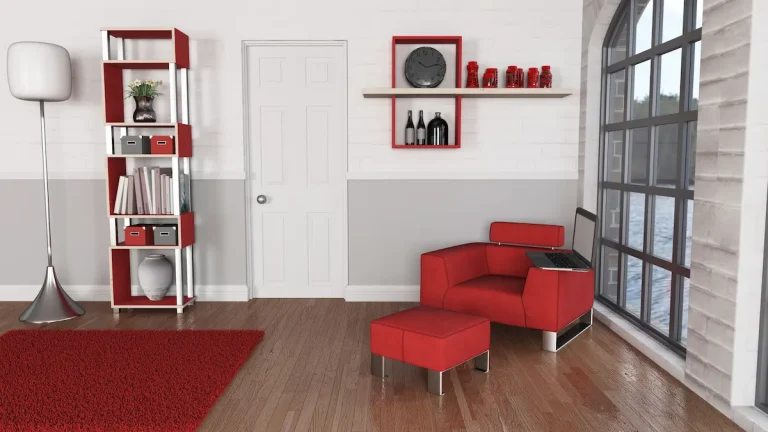Commercial vinyl flooring, known for its durability and stylish flooring options, has become a popular choice for businesses looking to enhance their spaces. But what exactly is it, and is it suitable for both commercial and residential spaces?
This article explores the many benefits and potential drawbacks of vinyl flooring, discusses the ideal thickness for various commercial environments, including residential LVT options, and highlights factors that influence its lifespan.
It also provides guidance on selecting the right type, features to consider, maintenance tips, cleaning precautions, and insights into popular brands and pricing.
Keep reading to discover how commercial vinyl flooring can transform your business space with beautiful collections and versatile options.
What Is Commercial Vinyl Flooring?
Commercial vinyl flooring is a versatile and durable flooring solution specifically designed to meet the demands of high-traffic commercial environments such as hospitals, schools, offices, and retail spaces.
Made from synthetic materials, this type of flooring offers a range of innovative designs and practical solutions, including luxury vinyl tile, that combine aesthetic appeal with functionality. Its unique properties ensure slip resistance and comfort underfoot, catering to the needs of both businesses and their clients.
Furthermore, commercial vinyl flooring supports hygiene and cleanliness, making it an ideal choice for areas requiring high maintenance standards.
Is Vinyl Flooring Good for Commercial Use?
Vinyl flooring is indeed suitable for commercial use, as it combines durability, easy maintenance, and aesthetic appeal, making it a preferred choice among business owners.
Its robust nature allows it to withstand the wear and tear of high-traffic environments while providing a comfortable surface for employees and customers alike.
Furthermore, many vinyl flooring options come with safety features such as slip resistance and hygienic qualities, making them particularly beneficial in settings such as kitchens, bathrooms, and healthcare facilities.
The Benefits of Using Vinyl Flooring in Commercial Spaces
The benefits of using vinyl flooring in commercial spaces are numerous, including its high-quality construction, cost-effectiveness, and comfort underfoot, making it a seamless solution that contributes to a pleasant environment for both staff and customers.
Vinyl flooring products are designed to endure heavy foot traffic while offering a stylish finish that can align with various design requirements, from contemporary looks to vintage designs. The easy installation process and low maintenance demands make it an attractive option for businesses aiming to minimise downtime.
Incorporating luxury vinyl into commercial settings not only enhances aesthetics but also provides a multitude of practical benefits.
- Durability: With its robust construction, it resists scratches, dents, and stains, making it ideal for bustling environments and high-traffic areas.
- Easy Maintenance: A simple sweep and occasional mop suffice to maintain its appearance, providing easy maintenance that saves both time and resources.
- Design Variety: The range of unique designs, from contemporary looks to vintage designs, ensures that businesses can find an option that perfectly matches their brand identity.
- Cost-effectiveness: Long-lasting and affordable, it reduces the need for frequent replacements, ultimately benefiting the bottom line.
These aspects demonstrate how flooring innovation, driven by industry manufacturers such as Karndean and Quick-Step, is revolutionising commercial interiors, making them both functional and visually appealing.
The Drawbacks of Using Vinyl Flooring in Commercial Spaces
While vinyl flooring offers numerous advantages, there are certain drawbacks to consider when using it in commercial spaces, such as potential environmental concerns and limited lifespan compared to other durable flooring options.
Some products may not meet sustainability standards, which can be a significant consideration for businesses aiming to reduce their environmental footprint.
The longevity of vinyl flooring often falls short when compared to alternatives like ceramic tiles or hardwood, often used in residential flooring.
This means that businesses might find themselves replacing the flooring more frequently, leading to increased costs over time.
Its environmental impact should not be underestimated; the manufacturing process can contribute to pollution and waste, raising concerns about sustainability.
To illustrate these points, here are more specific aspects to consider:
- Durability Concerns: While some vinyl products are resilient, others may scratch or dent more easily, especially in high-traffic areas.
- Installation Challenges: A poorly executed installation can lead to significant issues, such as bubbles and seams that come apart, demanding careful attention.
- Maintenance Tips: Regular cleaning and timely maintenance are crucial to prolonging the life of vinyl flooring, which can be an added commitment for businesses.
Ultimately, it is vital for businesses to weigh these factors against the immediate benefits of vinyl flooring, considering their long-term sustainability goals and operational requirements.
What Thickness Is Best for Commercial Vinyl Flooring?
The best thickness of vinyl flooring for commercial use typically ranges from 20 mil to 40 mil, depending on the specific requirements of the space and the expected foot traffic. A thicker vinyl flooring option provides increased durability and resistance to wear, making it suitable for heavy-duty commercial environments such as hospitals and retail stores.
Moreover, selecting the right thickness not only enhances performance but also contributes to the overall aesthetic appeal of the flooring solution, ensuring a lasting impression on clients and customers, aligning with your business’s aesthetic requirements.
What Factors Should Be Considered When Choosing the Thickness of Vinyl Flooring?
When choosing the thickness of vinyl flooring, several factors must be considered, including the type of commercial setting, expected foot traffic, and maintenance requirements. High-traffic areas such as schools and offices may necessitate a thicker vinyl to withstand daily wear and tear, while areas with less activity might afford a thinner option. The ease of maintenance and cleaning precautions should be evaluated to ensure that the chosen thickness aligns with the practical needs of the environment.
Understanding these elements, including insights from flooring experts, will significantly influence the decision-making process. Consider the following:
- Foot Traffic: Assessing the volume of foot traffic can guide you towards an appropriate thickness. A bustling retail space, for instance, not only experiences increased footfall but also demands a solution that can handle intense use.
- Maintenance: Thicker vinyl often requires more rigorous cleaning schedules, so it is essential to balance durability with practicality. High-durability options may come with more maintenance considerations.
- Business Environment: The type of business plays a crucial role; a high-end restaurant may require a different aesthetic and sturdiness compared to a warehouse setting.
Ultimately, conducting a thorough evaluation of these factors will help ensure that you select the right vinyl flooring thickness suited to your specific needs.
How Long Does Commercial Vinyl Flooring Last?
The lifespan of commercial vinyl flooring typically ranges from 10 to 20 years, depending on various factors such as the quality of the product, the level of foot traffic, and the maintenance practices employed.
High-quality vinyl flooring options, particularly those designed for heavy-duty use, can last longer and provide better performance than lower-grade alternatives.
Regular maintenance and adherence to cleaning precautions can significantly enhance the longevity of the flooring, ensuring it retains its aesthetic appeal and functionality over time.
What are the Factors Affecting the Lifespan of Commercial Vinyl Flooring?
Several factors can impact the lifespan of commercial vinyl flooring, including foot traffic levels, installation quality, and regular maintenance. Understanding these elements is crucial for ensuring that the flooring remains in good condition over time. Areas subjected to heavy-duty use, such as restaurants or retail shops, will naturally wear down flooring more quickly than less-trafficked spaces like private offices.
Improper installation, whether DIY-friendly or professional installation, can lead to issues such as peeling, while consistent maintenance practices, including cleaning and protective measures, can significantly extend the flooring’s durability and overall appearance.
Ultimately, foot traffic is a major decisive factor that affects how long the floor lasts. Locations with high footfall generate more wear and tear, necessitating frequent monitoring and maintenance, crucial for heavy-duty and safety flooring needs.
Conversely, less frequented areas may afford homeowners and business operators the luxury of less intensive upkeep.
- Installation quality: A skilled installer will ensure that the vinyl flooring is laid out correctly, reducing the risk of premature damage.
- Cleaning precautions: Regularly sweeping and mopping can help prevent dirt build-up that wears down the surface.
- Maintenance tips: Using floor protectors on furniture and routinely checking for signs of damage can prolong its lifespan.
By addressing these specific factors, facility managers can ensure their commercial vinyl flooring remains an attractive and durable choice for years to come.
How to Choose Commercial Vinyl Flooring
Choosing the right commercial vinyl flooring involves several key criteria, including design variety, comfort, and suitability for the specific commercial environment.
Business owners should consider factors such as durability, maintenance needs, and aesthetic appeal when selecting flooring that meets both functional and design requirements.
Additionally, the ease of installation and the flooring’s performance under high traffic conditions are critical elements to consider to ensure a successful choice.
a. The Key Considerations When Choosing Commercial Vinyl Flooring
When choosing commercial vinyl flooring, key considerations include durability, maintenance requirements, and aesthetic requirements to create a cohesive look for the business environment. It is essential to select a flooring option that offers the right balance between functionality and visual appeal, ensuring that it aligns with the branding and design goals of the space. One must consider the flooring’s performance under varying conditions, such as high traffic and exposure to water or spills.
The high-quality options available in the market today provide various benefits that contribute to long-term satisfaction. When evaluating the choices, it is vital to consider:
- Durability: Look for products that can withstand heavy foot traffic without compromising their integrity, as this will reduce the need for frequent replacements.
- Design: Stylish flooring can significantly enhance the atmosphere of a commercial space, so selecting designs that reflect the brand’s identity is crucial.
- Maintenance Needs: Opt for easy maintenance options that simplify cleaning and enhance the longevity of the flooring, ensuring it remains attractive and functional.
By taking these factors into account, one can create a beautiful and practical environment that meets business needs while appealing to customers.
b. The Different Types of Commercial Vinyl Flooring Available
When exploring options for commercial vinyl flooring, various types are available, including luxury vinyl tiles, safety flooring, and standard vinyl sheets, each serving unique functions and design preferences. Luxury vinyl tiles offer a high-end aesthetic while providing durability and ease of maintenance, making them suitable for upscale environments. Safety flooring, on the other hand, is specifically designed for areas requiring slip resistance, making it ideal for kitchens and hospitals, while standard vinyl sheets provide a cost-effective solution for lower-traffic areas.
Each type of vinyl flooring has its own distinct advantages:
- Luxury Vinyl Tiles (LVT): Available in a variety of designs and textures, LVT mimics natural materials like wood or stone and is suitable for high-end retail spaces.
- Safety Flooring: Brands like Polysafe Standard and Altro create products that ensure safety without compromising on style, making them perfect for healthcare facilities.
- Standard Vinyl Sheets: These are versatile solutions that can withstand everyday wear, ideal for schools and offices where budget-friendly options are a priority.
With each option offering different design possibilities, it’s crucial to evaluate the specific needs of the area when selecting commercial vinyl flooring.
c. The Key Features to Look for in Commercial Vinyl Flooring
Key features to look for in commercial vinyl flooring include slip resistance, waterproof capabilities, and comfort underfoot, ensuring a safe and pleasant environment for users.
In particular, commercial vinyl flooring plays a crucial role in maintaining not just safety, but also hygiene in high-traffic areas. A thorough understanding of the features can guide decision-making, particularly the waterproof properties that prevent moisture damage, making it invaluable in places prone to spills.
Slip resistance safeguards against accidental falls in critical areas such as kitchens and bathrooms. Hygienic qualities of vinyl ensure easy cleaning, reducing the build-up of bacteria and mould. Easy maintenance means quick clean-ups, saving time and resources.
Choosing the right flooring helps create an environment that is both functional and aesthetically pleasing.
d. The Maintenance and Cleaning Process for Commercial Vinyl Flooring
The maintenance and cleaning process for commercial vinyl flooring is crucial for prolonging its lifespan and ensuring it retains its aesthetic appeal, requiring routine cleaning precautions to avoid damage.
Regular sweeping and mopping with appropriate cleaning solutions help maintain the flooring’s durability, while addressing spills promptly will prevent staining and deterioration. Along with cleaning, periodic inspections of the flooring can help identify any necessary repairs, ensuring the flooring remains in optimal condition for years to come.
To maximise the effectiveness of maintenance tips, it’s essential to establish a consistent daily cleaning routine. This includes:
- Daily sweeping to eliminate grit and dirt that can cause scratches.
- Mopping with a pH-neutral cleaner to remove scuffs and maintain shine.
- Using mats at entrances to reduce outside debris.
Industry manufacturers recommend conducting periodic inspections every six months. These inspections should focus on:
- Checking for loose seams or edges.
- Identifying areas that require resealing.
- Assessing any wear and tear on high-traffic zones.
By following these comprehensive guidelines, individuals will not only protect their flooring investment but also ensure that it stands the test of time while contributing to an inviting environment.
Some Popular Brands of Commercial Vinyl Flooring
Some popular brands of commercial vinyl flooring include Amtico, Polyflor, and Gerflor, each offering a range of high-quality products designed for various commercial applications. These industry manufacturers are known for their innovative designs and durable flooring solutions, making them trusted choices for business owners seeking both functionality and aesthetics. Each brand provides options that cater to different needs, from safety flooring to luxury vinyl tiles, enabling customers to find the perfect fit for their commercial environments.
These brands stand out in the marketplace due to their distinct characteristics:
- Amtico: Known for their wide variety of stylish flooring designs, Amtico excels in producing high-tech luxury vinyl tiles that resemble natural wood and stone.
- Polyflor: A leader in commercial safety flooring, their products include unique slip-resistant surfaces, making them ideal for high-traffic areas.
- Gerflor: This brand stands out with vibrant colours and creative patterns, perfect for brands looking to make a bold statement within their commercial spaces.
By choosing any of these manufacturers, businesses can effectively blend stylish flooring with practical advantages.
How Much Does Commercial Vinyl Flooring Cost?
The cost of commercial vinyl flooring can vary significantly, typically ranging from £20 to £50 per square metre, depending on factors such as quality, brand, and installation requirements. Understanding the various price points is essential for making informed decisions, as businesses often have unique needs that can influence their budget constraints and overall value assessment.
When considering the price of vinyl flooring, it is important to take into account several factors that can affect the overall cost:
- Quality of Materials: Higher quality vinyl tends to have better durability and aesthetic appeal.
- Brand Reputation: Established brands may charge more, but they typically offer guarantees and superior customer service.
- Installation Complexity: The more intricate the layout or environment, the higher the installation costs may be.
Choosing a professional for the installation process not only streamlines the procedure but also enhances the longevity of the flooring.
This investment can save money in future repairs or replacements, making it a wise choice for any organisation.
Ultimately, weighing these factors against the overall budget will help businesses strike a balance between cost and quality.
Conclusion
Commercial vinyl flooring stands out as a versatile and durable choice for various commercial environments, offering numerous benefits and features of flooring that cater to business needs. Its durability, easy maintenance, and aesthetic appeal make it a favoured option among business owners seeking practical floor coverings and flooring solutions. With advancements in design and technology, including engineering manufacturing, the options available today provide value and style, ensuring that commercial vinyl flooring remains a top contender in the flooring market.
This type of flooring is not only functional but also enhances the overall look of a workspace, creating a welcoming atmosphere for employees and customers alike. By choosing commercial vinyl flooring, including heavy duty and waterproof flooring options, businesses can benefit from:
- Cost-Effectiveness: The initial investment is further justified by its long lifespan, reducing the need for frequent replacements.
- Variety of Styles: From wood-effect to contemporary patterns, the variety ensures that it can seamlessly blend with any décor. Popular brands like Polyflor, Gerflor, and Amtico offer diverse options.
- Comfort and Safety: Many options offer cushioning underfoot, reducing fatigue, while slip-resistant finishes enhance safety.
The advantages of this flooring option make it an ideal choice for commercial settings, supporting both aesthetic and practical requirements effectively. Retailers like TEKA Flooring in the UK provide extensive collections, including DIY-friendly solutions.
Read also:


























